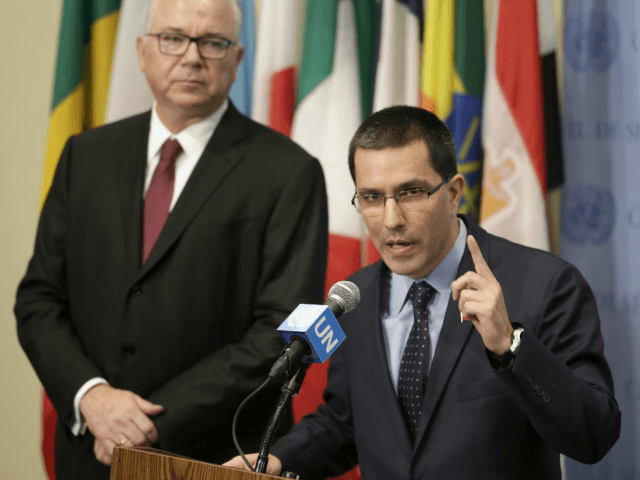Socialist dictator Nicolás Maduro’s top diplomat on Tuesday accused the administration of President Donald Trump of sabotaging upcoming talks between Maduro and President Juan Guaidó to hide the “resounding failure” of Trump’s policies.
Guaidó announced that he had agreed to send envoys to Barbados for another round of talks with the regime on Monday, days after insisting he would no longer engage in dialogue with Maduro’s illegitimate regime because the socialists have used talks repeatedly to cement their stranglehold on power following nationwide protests.
Guaidó became Venezuela’s legitimate head of state in January, following the expiration of Maduro’s last term. Maduro refused to step down and continues to inhabit the Caracas presidential palace, Miraflores, and control the military. His refusal to accept the terms of a legal mandate triggered a constitutional provision that allowed the National Assembly, the federal legislature, to appoint an interim president tasked with organizing elections and removing Maduro. The assembly chose its president, Guaidó.
After announcing in late April that he had finally convinced the nation’s military leadership to no longer take orders from Maduro, later conceding that his plan had failed, Guaidó accepted to send representatives to Norway for a first round of talks with the Maduro regime. The talks did not result in any meaningful headway and caused tensions with other opposition leaders who feared that the talks would allow Maduro time to imprison more dissidents and torture and kill more political enemies.
Talks mediated by Norway will resume in Barbados this week, both sides confirmed.
Venezuelan state television, still controlled by the Maduro regime, highlighted Foreign Minister Jorge Arreaza’s broadside against the United States in response to Guaidó agreeing to talks.
“Before the resounding failure of all its forms of aggression against Venezuela, the Trump administration intends to destroy the political dialogue process between the government and the opposition, trying to impose its war agenda,” Arreaza wrote on Twitter Tuesday, referring to the legitimate government as the “opposition.” “They will not be able to. Peace will triumph!”
Arreaza was responding to a report published by Spanish news service EFE that quoted a U.S. State Department official stating that Washington’s official position on talks is to support only “efforts to restore democracy and ease the suffering of Venezuelans and the burden of the crisis in the region,” but nothing that “leaves corrupt and not democratic actors in power or gives the Maduro regime time to consolidate its domination of the country.”
The unnamed State Department spokesperson in the EFE report added, “any discussion about a transition must include the departure of Maduro as a prerequisite for elections.”
The State Department’s remarks echo rumors in Venezuelan media that Guaidó’s team will demand an election without Maduro on the ballot. Venezuelan journalist Nelson Bocaranda alleged on Twitter, and later on his site Runrunes, that the legitimate government negotiators would demand “FREE elections WITHOUT Maduro in nine months.” “The reds [socialists] assure that Maduro will not be a candidate,” he added.
Bocaranda said his unnamed sources expected Diosdado Cabello, television host and head of Maduro’s illegal parallel legislature, or Héctor Rodríguez, the socialist governor of Miranda, to be on the ballot.
In addition to being one of Maduro’s closest confidants, Cabello is widely believed to be the head of the Cartel de los Soles, a multicontinental cocaine trafficking operation, and is currently under U.S. sanctions for his involvement in narcotics trafficking. During the early days of Maduro’s tenure, shortly after late dictator Hugo Chávez’s death, reports regularly circulated accusing Cabello, a military veteran, of conspiring to overthrow Maduro, a former bus driver.
The Runrunes report suggested that the nation’s military brass was behind the move to oust Maduro and replace him with another chavista.
“Barbados comes with a certain pressure from the military sector, who do not want a civil war or an invasion but are conscious of the gravity of the humanitarian crisis,” Bocaranda wrote.
Maduro did not give any indication he was considering stepping aside in his remarks about the talks Monday.
“I believe in dialogue, understanding among diverse [people], in permanent debate of the country’s issues, and through this context I established contact with the government of Norway, and the government of Norway did what we all now know … and with their helo we established a six-point agenda,” Maduro announced. He did not mention elections being among the six discussion topics.
Guaidó, meanwhile, is struggling to reconcile his announcement that his administration would no longer accept talks with Maduro last Tuesday with his remarks on Monday.
“There is never going to be a good moment to mediate … with kidnappers, human rights violators, and a dictatorship,” he said last week. “We are facing a deadly dictatorship.” He insisted his team would not negotiate as long as Maduro did not agree on “facilitating the cessation of the usurpation.”
Guaidó’s statement on Monday confirmed new talks and urged “people not to respond to the intrigue of a propaganda apparatus that seeks to foment hopelessness and division,” without elaborating on what “intrigue” he was referring to.
Mediation with the Maduro regime is extremely unpopular, nationwide polls suggest. According to a survey by the data firm Meganalisis taken in May, before the Norway talks were made public, 87.6 percent of Venezuelans oppose dialogue between Maduro and Guaidó.

COMMENTS
Please let us know if you're having issues with commenting.